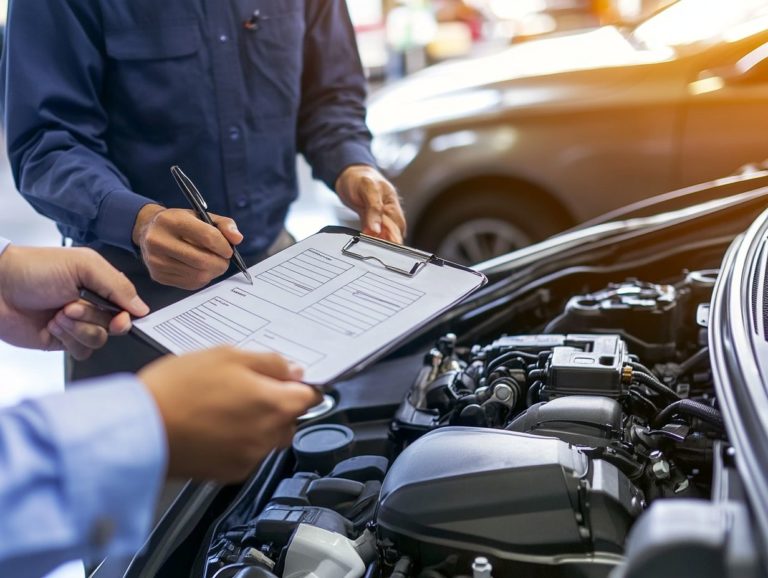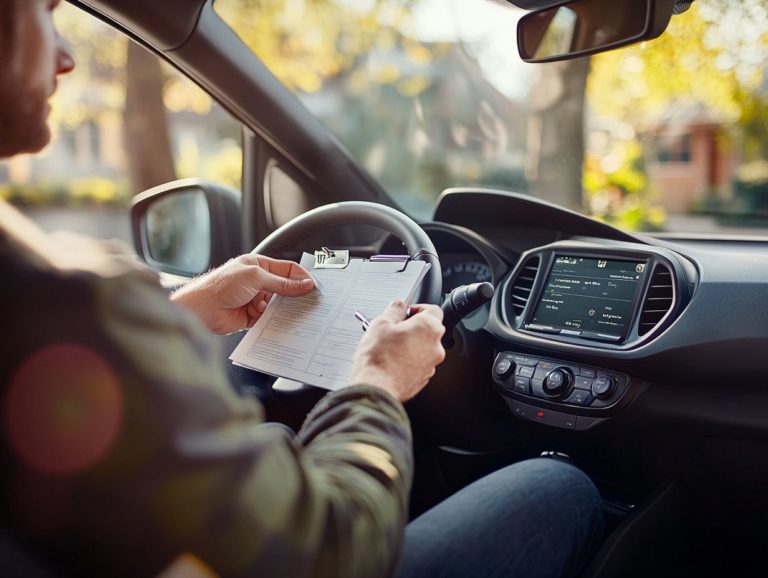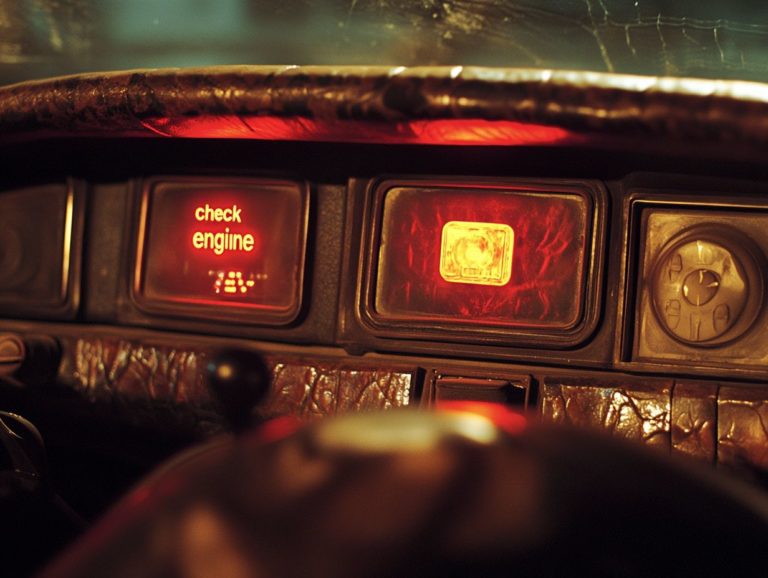Top 5 Questions to Ask Before Buying a Used Car
Buying a used car can feel like an exhilarating adventure, yet it can also be a bit overwhelming. With a multitude of options at your fingertips, it’s essential to pose the right questions to ensure you’re making a savvy investment.
This guide will walk you through five critical inquiries to consider before finalizing your purchase. You’ll delve into understanding the vehicle’s history, evaluating costs, and exploring financing options everything you need to navigate this process with confidence.
You will also uncover common red flags, essential documents to scrutinize, and weigh the advantages and disadvantages of purchasing from a dealer versus a private seller.
By the end, you will be ready to make a smart choice.
Contents
- Key Takeaways:
- 1. What Is the Vehicle’s History?
- 2. What Is the Condition of the Car?
- 3. What Are the Maintenance and Repair Costs?
- 4. Is the Price Fair?
- 5. What Are the Financing Options?
- What Are the Most Important Factors to Consider When Buying a Used Car?
- What Are the Most Common Red Flags to Look Out for When Buying a Used Car?
- Frequently Asked Questions
- What should I look for when buying a used car?
- How do I know if a used car is reliable?
- Are there any red flags to watch out for when buying a used car?
- What kind of warranty should I look for when buying a used car?
- Should I get a vehicle history report before buying a used car?
- Is it better to buy a used car from a dealership or a private seller?
Key Takeaways:
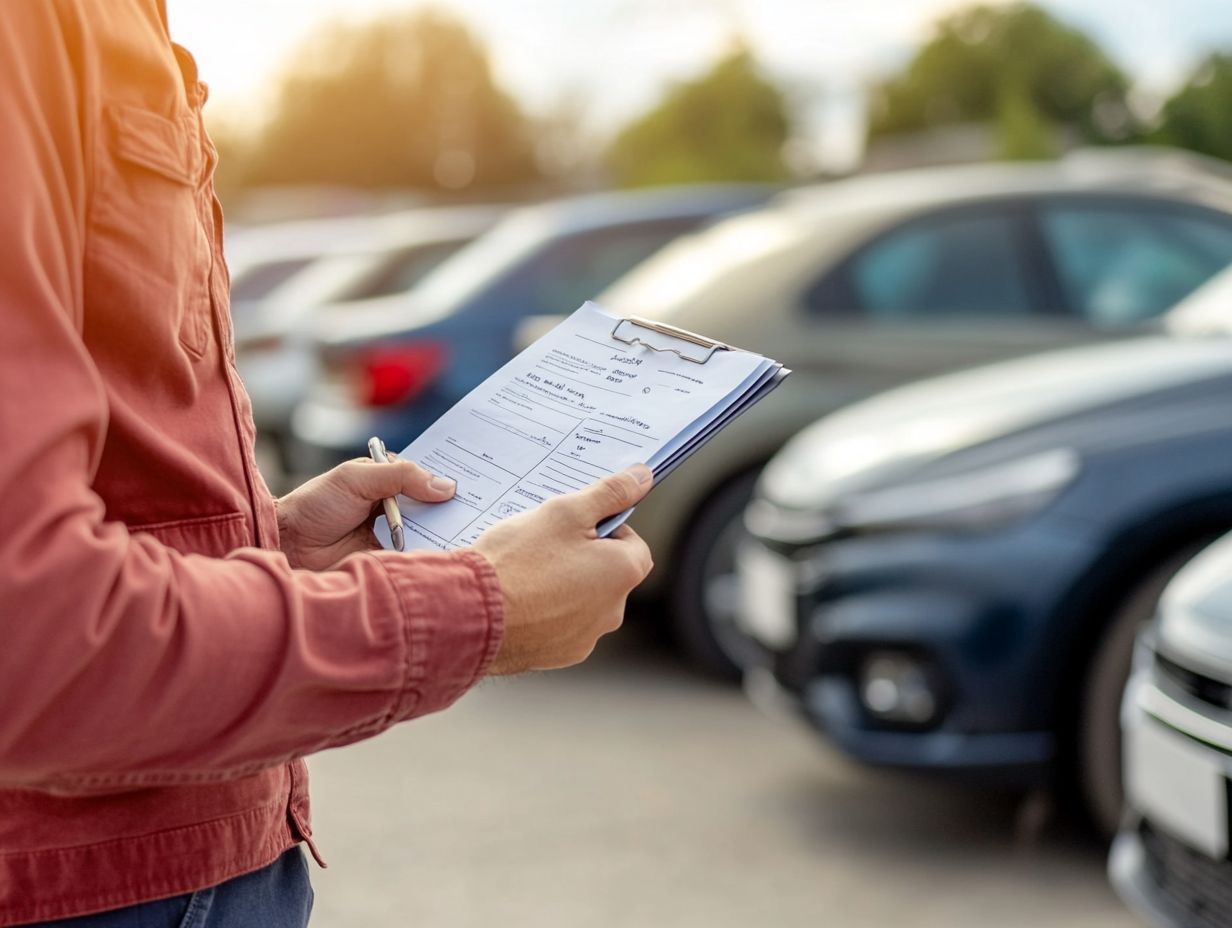
- Consider the vehicle’s history to ensure it has not been in any major accidents or had major repairs.
- Inspect the condition of the car thoroughly, including the exterior, interior, and engine, to determine if it is worth the price.
- Research the maintenance and repair costs for the specific make and model of the car to avoid unexpected expenses.
1. What Is the Vehicle’s History?
Understanding a vehicle’s history is essential for you as a potential buyer. It unveils critical information about the used car’s past, such as its accident history and maintenance records factors that ultimately shape both the car’s value and your decision-making process.
By using services like CARFAX or AutoCheck, you can easily acquire a comprehensive vehicle history report. These reports provide invaluable insights into whether the vehicle has been involved in accidents and its regular service records.
This information is crucial in evaluating the vehicle’s current condition and resale value. For instance, a car with a clean accident history is likely to command a higher price than one that has suffered damage. Understanding the ownership history also offers context for any wear and tear, giving you the power to make informed decisions that protect your investment.
2. What Is the Condition of the Car?
Evaluating the condition of a used car requires a careful inspection of both its mechanical integrity and visual appeal. You ll want to focus on aspects such as potential mechanical problems and exterior damage.
This thorough evaluation is crucial, not just for spotting immediate repairs but also for assessing the overall reliability of the vehicle. Key areas to inspect include:
- The engine: Check for leaks or signs of wear and tear.
- The electrical system: Hidden issues may lead to future headaches.
- The exterior: Look for any signs of past accidents or rust.
Engaging an independent mechanic for this evaluation can be particularly beneficial. Their unbiased perspective and expertise can reveal concerns that might escape your notice, ultimately giving you the power to make a more informed purchasing decision.
3. What Are the Maintenance and Repair Costs?
Understanding the maintenance and repair costs of a used car is crucial for effective budgeting. Factors such as the vehicle’s service history and potential repairs can significantly influence your overall ownership expenses.
By reviewing the service records, you can uncover insights into previous repairs and identify any recurring issues that may lead to future costs. Common repairs often involve the brake system, transmission, and electrical components, which can unexpectedly strain your finances.
Don t overlook the importance of car insurance in your calculations. Premiums can vary widely based on the vehicle’s make and model. For example, high-performance cars typically come with higher insurance rates due to their increased risk of accidents, whereas more reliable vehicles might offer lower premiums. This variation can ultimately impact your total cost of ownership significantly.
Start your journey to find the perfect used car today!
4. Is the Price Fair?

Determining whether the seller’s price for a used car is fair requires careful research. Use resources like Kelley Blue Book and develop a solid understanding of the vehicle’s condition to effectively engage in negotiation and secure a budget-friendly purchase.
By comparing listings from Kelley Blue Book with those you find in local marketplaces, you can gain insight into market dynamics. This comparison allows you to evaluate how various factors such as mileage, age, and features impact overall value.
Check beyond the listed price! Investigate the car’s history for past accidents or significant repairs. This knowledge will strengthen your negotiating power, especially if the vehicle shows signs of wear or has a less-than-ideal maintenance record.
Understanding how trade-ins when you exchange your old vehicle for credit towards the purchase of a used car might factor into the transaction can help you negotiate better.
5. What Are the Financing Options?
Exploring financing options is essential when you’re in the market for a used car. Understanding average auto loan rates, monthly payment expectations, and the financing options available gives you the power to make informed decisions and sidestep buyer s remorse.
As you evaluate your budget, consider the various financing alternatives at your disposal loans from banks, credit unions, and dealership financing offers. Each option comes with its own set of terms and interest rates, which can significantly impact your monthly payments.
It’s vital to accurately calculate these payments by considering the loan amount, interest rate, and loan term. These elements will ultimately shape the overall cost of the vehicle over time.
By incorporating a well-structured budget, you can ensure that managing your monthly expenses remains comfortable. This allows you to enjoy your purchase experience without stretching your finances too thin.
What Are the Most Important Factors to Consider When Buying a Used Car?
When you embark on the journey of buying used cars, understanding the key factors such as the vehicle’s worth, mileage, seller motivations, and warranty status can significantly enhance your chances of securing great deals while minimizing any potential buyer’s remorse.
Car mileage stands as a pivotal element that directly influences resale value. Generally, lower mileage indicates less wear and tear, making the vehicle more attractive to prospective buyers. Understanding the seller’s motivations can also provide insights into the car’s condition. If they seem eager to sell, it might hint at hidden issues, while a reluctant seller could suggest a sentimental attachment that often points to a well-maintained vehicle.
Don t underestimate the importance of warranties; having one can offer reassurance regarding future repairs. This ensures peace of mind that your investment is safeguarded. By following this approach, you can confidently navigate the complexities of the used car market.
What Are the Most Common Red Flags to Look Out for When Buying a Used Car?
Identifying common red flags when buying a used car is essential for steering clear of potential pitfalls. Watch out for warning signs like mechanical issues, hidden problems, exterior damage, and an unclear accident history these can often indicate deeper troubles lurking beneath the surface.
As a prospective buyer, you should stay vigilant during inspections and test drives. Certain indicators can reveal underlying concerns. For instance, a visibly uneven paint job might suggest that the car has undergone repairs from previous accidents. Additionally, rust spots and corrosion can hint at a history of poor maintenance.
It’s also crucial to ask for service records; a lack of documented maintenance could signal neglect. If the seller provides inconsistent information about the vehicle’s history or struggles to answer your questions transparently, take it as a cue to tread carefully before finalizing your purchase.
What Are the Most Important Documents to Check When Buying a Used Car?
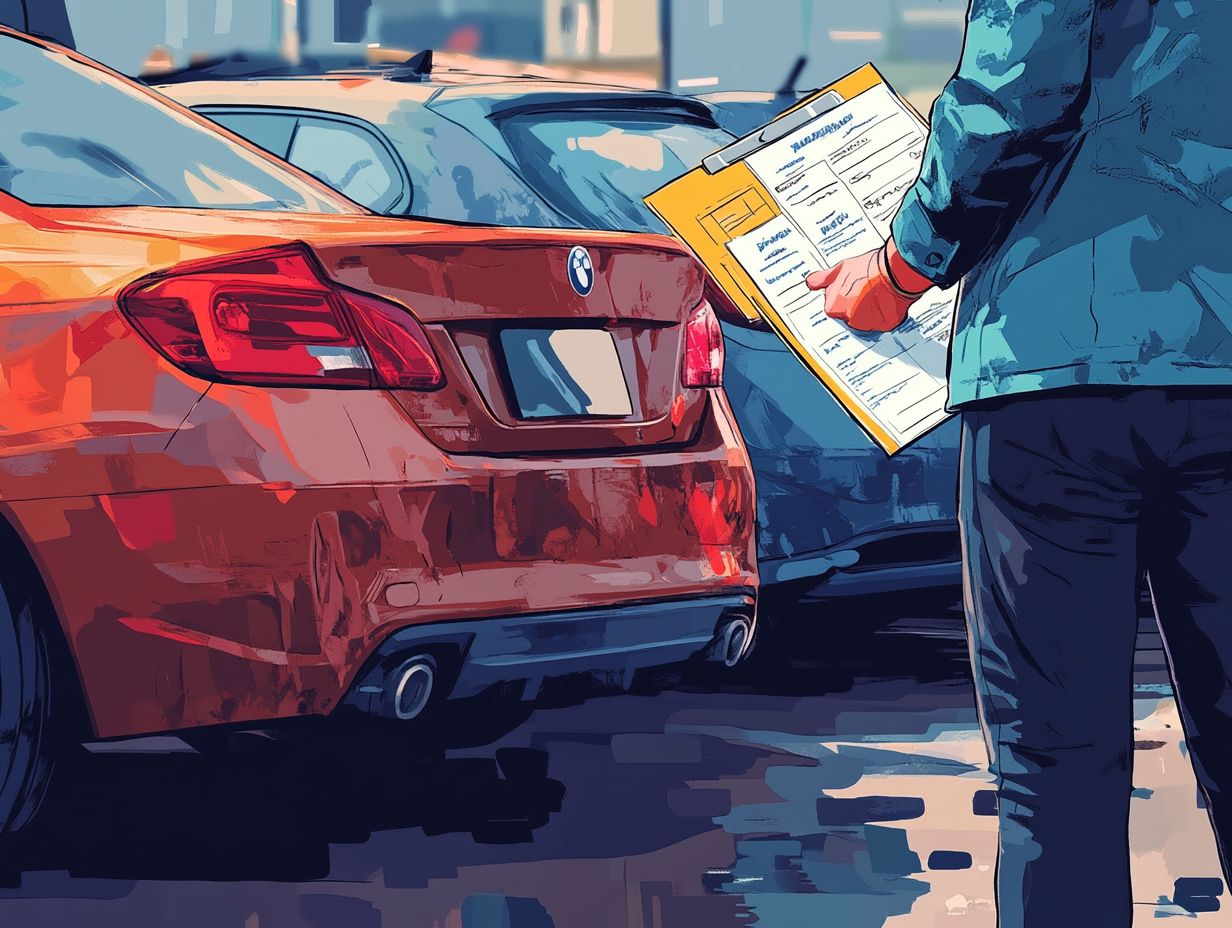
When you re in the market for a used car, it s imperative to check essential documents like the vehicle history report, the title, service records, and maintenance history. Doing this shows everything clearly and gives you the power to make an informed decision.
Without these critical components, you risk uncovering hidden issues that could lead to costly repairs later on. A clear title not only affirms that the seller has rightful ownership but also confirms that the vehicle is free from any liens or legal claims.
Reviewing service and maintenance records is equally crucial. These documents provide valuable insights into how well the vehicle has been cared for, revealing usage patterns and whether routine maintenance has been consistently performed. This information boosts your confidence in the vehicle s overall condition and longevity. Ultimately, this leads to a more satisfying purchase experience.
What Are the Benefits of Buying a Used Car from a Dealer?
Buying a used car from a dealership offers you a wealth of advantages, including flexible financing options, warranties on vehicles, and the convenience of being able to return cars that don t quite meet your expectations. This makes your car-buying experience secure and totally hassle-free!
On top of these benefits, purchasing from a dealership provides you with the peace of mind that comes from comprehensive vehicle inspections. These inspections ensure that any hidden issues are identified before you make your purchase.
Dealerships typically present a variety of financing options tailored to different budgets and credit situations. This makes it simpler for you to secure a loan that aligns perfectly with your financial goals. You might also find certified pre-owned vehicles, which are cars that meet strict quality checks and come with added warranties. This ultimately delivers greater value and reliability.
All these factors work together to create a smoother and more trustworthy car-buying experience for you.
What Are the Benefits of Buying a Used Car from a Private Seller?
When you consider purchasing a used car from a private seller, you often find yourself in a prime position for securing excellent deals and enjoying more flexible negotiations. Private sellers may have various motivations for selling, which can lead to more favorable pricing than what you’d encounter at a dealership.
This flexibility enables you to talk directly about the car’s condition, history, and any personal anecdotes the seller might share, adding valuable context to your decision. Since private sellers usually operate with lower overhead costs compared to dealerships, they are often inclined to pass those savings onto you.
However, it s essential to remain vigilant about potential pitfalls. Conducting a thorough inspection of the vehicle and carefully reviewing service records can significantly reduce your risks.
Ensuring that all necessary documentation such as the title and previous maintenance receipts is in order will help protect you from future complications.
What Are the Steps to Take After Purchasing a Used Car?
After you ve purchased a used car, it s essential to follow a few key steps. Securing car insurance, completing the title transfer, and organizing maintenance records are all critical to ensure a seamless transition into ownership and to prevent any future complications.
- Start by selecting the right coverage that aligns with your budget and driving needs. Don t wait secure your investment on the road.
- Next, make it a priority to complete the title transfer promptly. This establishes your legal ownership. Checking local DMV regulations can save you time and hassle in the process.
- Organizing your records like purchase receipts and warranty documents will not only help in future resale situations but also provide valuable insights for servicing needs.
This way, any prospective buyers can see the car’s upkeep history, fostering confidence in its condition. By taking this systematic approach, you re not just protecting your investment; you re making a wise financial decision.
Frequently Asked Questions
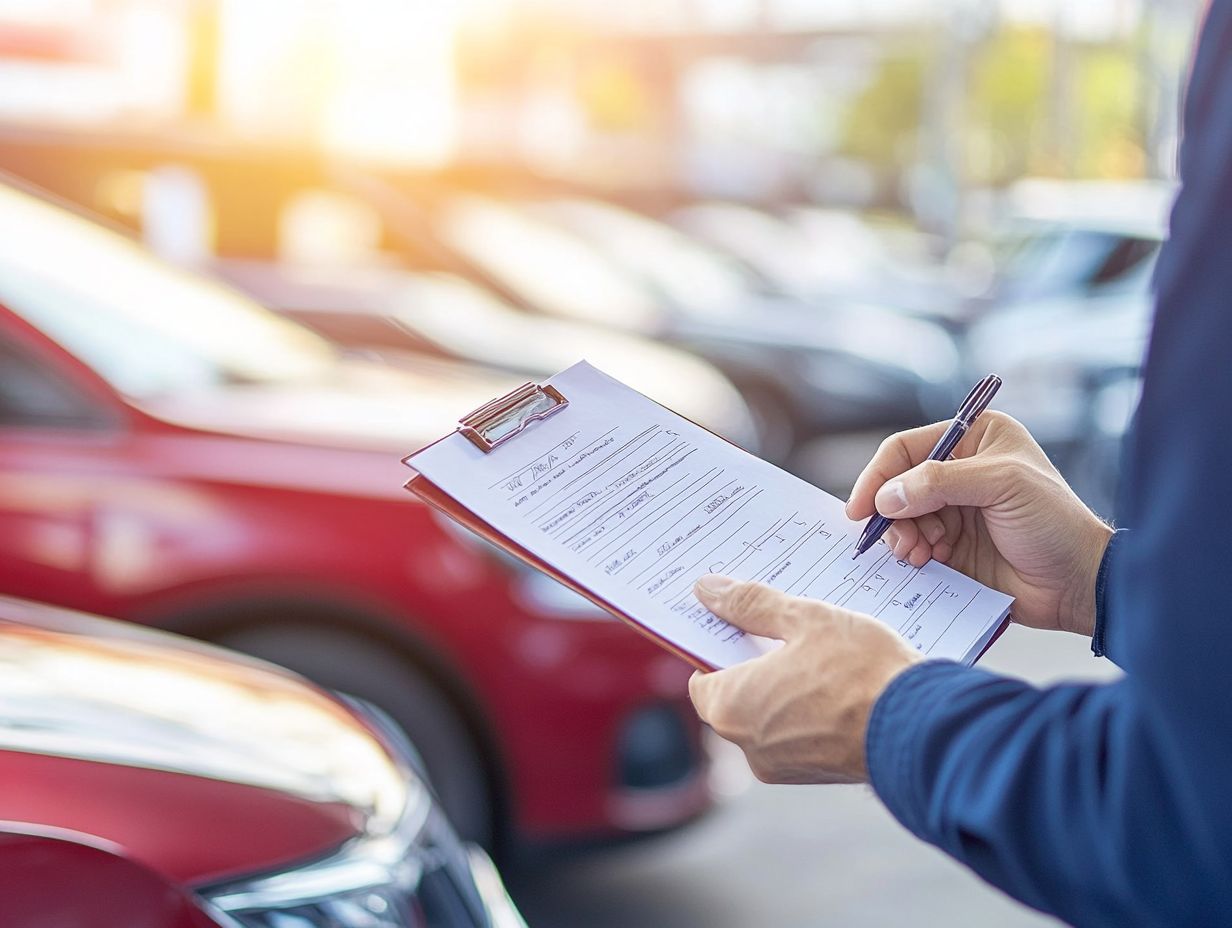
What should I look for when buying a used car?
Before you buy a used car, check its overall condition and maintenance history. Look for damage and request maintenance records to see how well it has been cared for.
How do I know if a used car is reliable?
Research the make and model online to find owner reviews and ratings. Always have a trusted mechanic check the car first!
Are there any red flags to watch out for when buying a used car?
Yes, watch out for undisclosed accidents, a salvage title (which means the car was severely damaged), and a high number of previous owners. Be cautious of unusually low prices or aggressive sales tactics.
What kind of warranty should I look for when buying a used car?
Look for a warranty that covers major mechanical issues. This gives you peace of mind and protection if something goes wrong shortly after your purchase.
Should I get a vehicle history report before buying a used car?
Get a vehicle history report ASAP! It provides crucial information about accidents, title changes, and other details that could affect the car’s value and reliability.
Is it better to buy a used car from a dealership or a private seller?
Both options have pros and cons. Dealerships may offer more reliability and a wider selection, but they can be pricier. Private sellers might give you a better deal, but there’s a higher risk of hidden issues.


